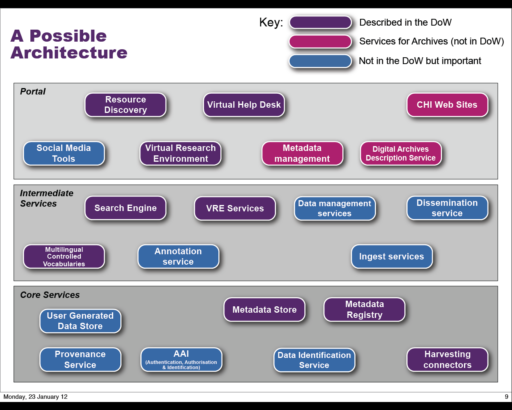Recent Work Towards the EHRI Portal

Petra Links is an archivist who works at the NIOD Institute for War, Holocaust and Genocide Studies in Amsterdam and is very involved in EHRI. Here Petra gives an overview of recently completed work that paves the way for the creation of the portal: the identification of user requirements, the research on metadata standards and the implementation and development of a thesaurus in combination with authority files.
 One key challenge the EHRI project faces is the dispersed nature of the material. Holocaust archives are fragmented and scattered all over the world, which complicates the access to these sources. As a result, important archives often remain hidden for researchers. Institutions dealing with these sources sometimes collect copies of original documents that are kept elsewhere. This is helpful in terms of access, but may unintentionally lead to decontextualied documents with risks and problems for future researchers who try to interpret the information.
One key challenge the EHRI project faces is the dispersed nature of the material. Holocaust archives are fragmented and scattered all over the world, which complicates the access to these sources. As a result, important archives often remain hidden for researchers. Institutions dealing with these sources sometimes collect copies of original documents that are kept elsewhere. This is helpful in terms of access, but may unintentionally lead to decontextualied documents with risks and problems for future researchers who try to interpret the information.
Better retrieval
For the portal, EHRI seeks to find a solution by digitally creating intellectual connections between collections and the institutions holding them. This improves the visibility of relevant archives and institutions on the web and leads to better retrieval. The EHRI team of researchers uses new opportunities created by the digital humanities to support the current infrastructure of Holocaust related research, which came out of an analogue situation.
Data driven
EHRI contains many subprojects and Petra Links participated in three of these, all of a technical nature and in preparation for the online portal. Two were related to gathering the content for the portal, and were ‘data driven’. Petra was involved in the research on metadata standards.
A survey among EHRI’s partner institutions gave insight into the many different ways institutions with Holocaust related archives currently offer their services to the public. Among other things this resulted in a set of guidelines on how new data can be structured to support the needs of Holocaust researchers, and at the same time comply with international standards.
Another problem an international project like EHRI encounters is the many different languages used by both the archival institutions and the researchers. By building a thesaurus in nine languages, EHRI made a start to improve the multilingualism of the retrieval process.
Prominent role of the archivist
Research on the needs of users gave an excellent understanding of how Holocaust research is currently performed. Interviews with archivists made EHRI realise that while archival descriptions are crucial for retrieval, archivists themselves also play a prominent role as mediators between researchers and collections. To support the link between archivists and researchers, the EHRI portal will feature a virtual helpdesk that will enable researchers to benefit from the expertise of the content specialist working at Holocaust related institutions.
Although the project still has one year to go, many of Petra’s tasks have been completed and the results are now being implemented in the EHRI portal and virtual research environment, that will be launched in early 2015.
Read more about Petra Link’s work, with her EHRI colleague Reto Speck:
Petra Links and Reto Speck. “The Missing Voice: Archivists and Infrastructures for Humanities Research.” International Journal of Humanities and Arts Computing. 7.1-2 (Oct. 2013).
Petra Links and Reto Speck. “Research infrastructures and archival inter-mediation.” Building infrastructures for archives in a digital world. Dublin: APEx, 2013. Conference paper.
